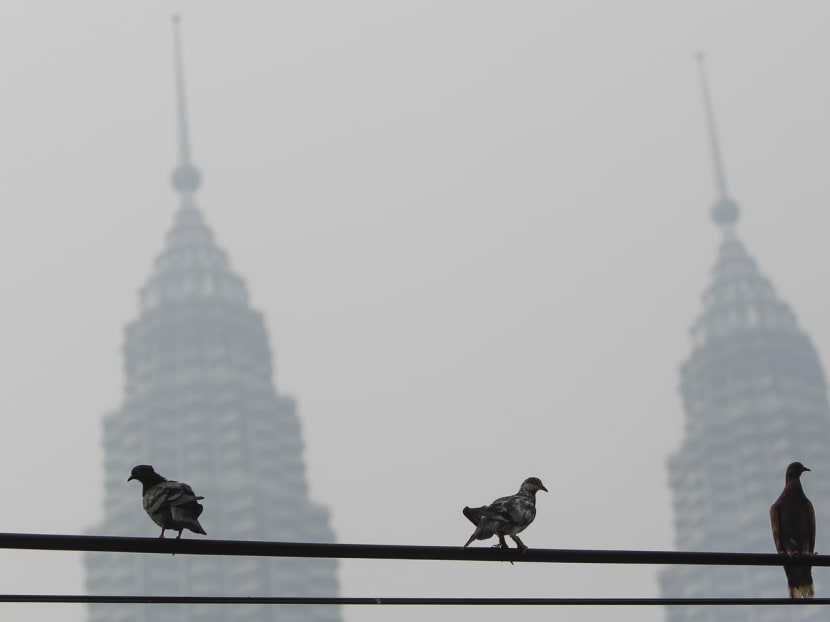Indonesia must act against those causing haze: Najib
KUALA LUMPUR — Malaysian Prime Minister Najib Razak yesterday urged Indonesia to take firm action against parties who are behind the transboundary haze smothering the region, shortly after his deputy stated that Jakarta’s pledge to tackle the problem in three years was too slow.

Malaysia's landmark building, Petronas Twin Towers, shrouded with haze in Kuala Lumpur, Malaysia, Sunday, Oct. 4, 2015. Photo: AP
KUALA LUMPUR — Malaysian Prime Minister Najib Razak yesterday urged Indonesia to take firm action against parties who are behind the transboundary haze smothering the region, shortly after his deputy stated that Jakarta’s pledge to tackle the problem in three years was too slow.
“(Irresponsible plantation companies) are operating there, we want Indonesia to take action, summonsing is one thing but proving they conducted such acts is another. Only Indonesia alone can gather evidence and convict the companies concerned with whatever actions,” Mr Najib told reporters yesterday when asked about the worsening haze situation.
He pointed out that only Indonesia could prove if the transboundary haze was due to plantation companies carrying out open burning, or due to the effects of weather changes.
Mr Najib’s comments yesterday came after Deputy Prime Minister Ahmad Zahid Hamidi hit out at Jarkarta’s pledge to resolve the annual haze crisis in three years through measures such as cracking down on open fires in its forests, saying that this may prove to be too slow.
“Malaysia welcomes the measures (announced by Indonesian President Joko Widodo) but three years may be too long,” the deputy premier told local media yesterday, adding that Malaysia hopes Indonesia’s commitment to solve the annual haze problem will not only be on paper, but will be translated and implemented to end this problem.
“We know that the leadership and people of Indonesia are concerned towards what is happening, but we feel that the efforts are not yet enough to solve the problem because it is happening every year and we have to spend too much in medical costs, especially for those suffering from asthma,” Mr Zahid said.
Last month, in an interview with broadcaster BBC, Mr Widodo said that the annual fires that have blanketed South-east Asia in hazardous smoke are not a problem that can be easily solved.
Mr Widodo also outlined measures that the Indonesian authorities were taking — such as building water reserves and canals in the forest, as well as better legal enforcement against burning in forests — but cautioned that it would take three years to see results.
According to the Malaysian Department of Environment (DOE) yesterday, unhealthy air levels have continued to worsen, with air quality in Shah Alam — the state capital of Selangor — tipping into the “hazardous” range of the Air Pollution Index (API) with the highest recorded reading of 308.
In response to the worsening conditions, Malaysian Education Minister Mahdzir Khalid yesterday ordered schools across peninsular Malaysia, with the exception of Kelantan, to be closed today and tomorrow.
“For Kelantan, Sabah and Sarawak, the Education Ministry will monitor the haze hourly before deciding on the need to close schools. If the haze condition deteriorates in these three states, we will also take the same measure,” he announced.
This is the third time this year that Malaysian schools have been forced to close due to the transboundary haze.
Malaysian authorities had previously ordered schools to close on Sept 15 and 28.
In addition to the school closures, Malaysia Airports Berhad, the airport company that manages most of the airports in Malaysia, also announced yesterday that the deteriorating haze forced the runways of three airports in Malaysia to close.
Although the affected airports of Sultan Abdul Aziz Shah Airport in Subang, Sultan Abdul Halim Airport in Alor Setar and Sultan Azlan Shah Airport in Ipoh were subsequently reopened later in the day when conditions improved.
Speaking to reporters yesterday, Mr Zahid also addressed concerns raised by social media users regarding the differing air quality readings between Johor and Singapore.
The (DOE) had explained that Singapore’s readings for its Pollutant Standards Index (PSI) was also based on a sixth parameter of fine particulate matter (PM2.5) — which the latter had added on since last April — but Malaysia has yet to include this parameter in its calculations.
Mr Zahid said that Malaysia can look to Singapore and see how the neighbouring country measures its air pollution and use the same technology to measure the haze levels. “We could get the new equipment. But until we implement the (API) reading with the new equipment, we can at least follow their (Singapore) guidelines,” Mr Zahid.
Last week, an opposition lawmaker urged Malaysian authorities to upgrade all its monitoring equipment to measure PM2.5 fine particulate so as to accurately reflect the true health risks posed by the haze.
Over in Thailand, the transboundary haze blanketed several southern provinces, but the readings were still within the safety limit of 120 micrograms per cubic metre.
Director of the 16th Regional Environment Office (REO) in the southern Thai city of Songkhla, Halem Chemarikan, said that the city of Hat Yai was hardest hit yesterday — with the particulate matter in the air measured at 108 microgrammes per cubic metre, down from 136 at 8pm on Saturday. AGENCIES






